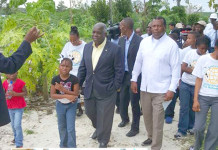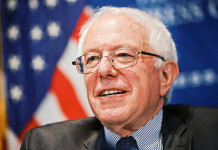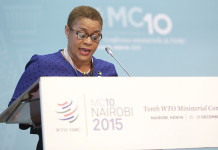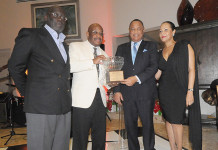
By: Michelle Lescure
World Press Review correspondent, Panama City , Panama , Aug. 1, 2002
As the world continues to absorb the fallout from corporate scandals in the United States , evidence is emerging that raises suspicions that a British telecommunications company may have colluded with the Panamanian government in a sweetheart privatization deal, then mismanaged the company at the expense of customers and employees. In 1997, U.K.-based Cable and Wireless PLC (C&W) outbid U.S.-based GTE by US$232 million to purchase 49 percent of the shares of Panama’s state-owned telecommunications company, INTEL, which had been converted into a Sociedad Anónima (private corporation) shortly before being put up for sale. If C&W’s bid seemed a little high, it did not raise many eyebrows outside the next meeting of its board. But as previously unreleased documents—including the contracts for the sale of the company and for the concession to administer and operate the phone company—emerge, they are casting shadows on an already unpopular deal. The sale of such a major state asset would seem to be the stuff of which grueling committee hearings and ferocious legislative debates are made. Yet Panama ’s Legislative Assembly never had the opportunity to debate or approve the deal. The contract was signed, sealed, and delivered by the executive branch, acting alone. According to the rationale offered to telephone workers and the nation at large at the time, INTEL was privatized because it didn’t have the resources to make necessary structural and technological investments, and because the government was a poor administrator. Private enterprise, it was believed, would be more successful in the company’s management. C&W was touted because it was supposed to be serious about expanding services, had solid capital resources to invest, and had long experience in the telecommunications field. Public government records indicate that even through the rockiest periods of Panama ’s recent history, INTEL earned Panama an average net profit of US$150 million yearly. But since the sale, despite increases in the number of customers and raises in rates for calls and other services, the government has only received some US$30 million per year for its 49 percent stake in the company. After the company privatized, unpopular measures were imposed. Student protests—dispersed with teargas—followed a 500-percent hike in the cost of phone calls within Panama . Millions of dollars were invested in a call center with dubious prospects for profitability. The company’s purchasing office was moved to Miami , raising costs and adding another layer of intermediaries to transactions. Many qualified workers were laid off, raising unemployment figures just as the Panamanian economy was beginning to stagnate. Today, documents are coming to light that cast suspicion on the deal.
It was not known to all bidders, for example, that after privatization INTEL would be left with a cash flow of more than US$109 million, or that it would benefit from two government promissory notes. But C&W did know, as evidenced by the document certifying their purchase of the shares. The promissory notes’ value is still not known by the press, the public, or indeed by the phone company workers, who own 2 percent of the privatized company’s shares.
Likewise, only C&W knew that, notwithstanding the stringent bid prequalification requirements, the winning bidder would be allowed to assign operation and administration functions to subsidiaries—in this case, Cable & Wireless Holding and Cable & Wireless Cala Management Services Limited, which was registered in Algeria with only one pound sterling as capital to invest in Panama . Public Registry records also reveal that C&W was never registered in Panama and had no legal representative in Panama . Yet the bidding rules clearly stated that bidders needed to be registered in Panama .
In the transfer of 49 percent of the shares, it was stipulated that C&W was not obliged to be the phone system’s direct operators, but would only be consultants. Nevertheless, the company was given a percentage of gross annual revenues, a percentage of pre-tax profits, and a percentage of the income from other sinking funds, which would normally go to the network’s operators, employees, or other shareholders.
The revelations come after a series of controversial privatizations. In 1997 and 1998, then-U.S. Ambassador to Panama William Hughes complained that the playing field in the bid for Panama ’s privatizing industries was not level.
On June 11, 2002, workers for the old INTEL sent a letter to President Mireya Moscoso supporting Ambassador Hughes’ protests, and extending them to INTEL’s sale.
The workers’ letter to President Moscoso charged that the company had been seriously mismanaged since its sale. For example, they observed, the general manager and executive team of C&W Panama had been changed four times in roughly as many years, and that 50 executives had been fired “at the stroke of a pen.”
Other company directives affected the former INTEL workers more directly. A 1995 law under which the utility was privatized said that the government, which would be a partner in the company, would deposit workers’ money into an account at the National Bank of Panama , and that workers would not be charged fees for this service. But the old utility’s employees, who weren’t privy to information about funds that were legally theirs, later found that their money had been deposited in a private bank run by a close friend of former President Ernesto Pérez Balladares, and that fees were being charged for the bank’s services. That bank has since ceased to exist, having been absorbed in a merger, and the acquiring bank now has the workers’ money. It is deducting fees for the services it has rendered.
At the end of 1999, an internal company report conducted by C&W’s Washington Audit Group found “the current situation… unsatisfactory…. Capital has been spent in unproductive and wasteful ways… with little previous preparation… [on] ill-advised projects… [with] insufficient planning and supervision….” Moreover, C&W’s internal reviewers found, “Constant management changes in the past two years have not helped… as the lack of a consistent focus [or] direction has obstructed the adoption of the best practices.” They concluded that mismanagement on the part of the executives, vice-presidents, and managers had caused enormous losses for C&W Panama and the government.
Representatives of the prestigious accounting and consulting firm KPMG, C&W’s auditors, were copied on the report.
Yet even as popular frustration with the administration of Panama ’s telecommunications network grew, public and corporate officials alike continued to inform the media, as well as C&W’s international partners in Panama , that nothing was seriously amiss at C&W Panama.
A Grand Tradition…
C&W’s critics charge that the company has changed little since its days as a 19th-century colonial monopoly extending across the British Empire .
The company’s ancestor laid the first trans-Atlantic telegraph cable in 1858. Though that particular project enjoyed only short-lived success, by 1927—after a series of mergers—C&W’s telegraph network spanned the globe. And though the company mostly set up shop in places with limited economic resources, it was usually able to extract its “pound of flesh.”
When Hong Kong was transferred from British control in 1997, taxpayers were forced to cough up billions to compensate C&W for breaking a monopoly license granted by the British administration in the mid-1980s. It may have seemed worth it to the taxpayers. During C&W’s monopoly, the company charged international rates for phone calls to Macao or other adjacent Chinese cities only 15 miles away.
Others have charged that the company still extorts unreasonably high rates from its clients in the Americas . In March 2001, five Caribbean nations joined together to force C&W to give up its monopoly, claiming that inflated phone costs were leaving them marginalized in the world economy. C&W tried to scare them off with predictions of a chaotic transition that would likely lead to phone service being disrupted. Service was never seriously disrupted, but the islands did suffer when C&W fired hundreds of its employees after losing its monopoly.
Tangled
Today, C&W Panama faces trials and lawsuits involving more than US$150 million demanded by suppliers and contractors. In February, the Public Services Regulating Entity, a government board that oversees privatized enterprises, fined C&W for non-compliance with a concession contract clause about maintenance of public telephones.
The workers who own the remaining 2 percent of the Panamanian C&W subsidiary’s shares have filed lawsuits to annul a bidding process they consider rigged, and to review the telecommunications company’s activities in Panama . After many protests sent to legislators, government ministers, and the president, they’re now seeing signs that give them hope that their concerns will be addressed. The workers and shareholders are claiming deceit, conspiracy, collusion, misappropriation, arbitrary use of public assets, and securities fraud. The latter offense is alleged to have been committed in concert with KPMG.
The big question now is whether GTE will sue the Panamanian government. A source close to the negotiations, who spoke on condition of anonymity, says that lawyers are set to meet with representatives of GTE and Mexican companies that had formerly provided services to C&W in Panama to discuss the possibility of such a lawsuit.
At present, neither President Moscoso nor Panama ’s comptroller general have addressed the workers’ complaints. The president of the Legislative Assembly has merely acknowledged receiving their note. Meanwhile Panamanians are losing patience with C&W’s inflated prices, billing errors, botched contracts, and spotty service.
One way or another, the concession will be revised. Under the terms of the 1997 privatization deal, C&W’s monopoly over fixed-line telephone services terminates at the end of this year, while the cellular phone duopoly that it shares with BellSouth runs through 2007. TRICOM, a company based in the Dominican Republic , is fighting in the Panamanian courts for the right to offer cellular service, and a Panamanian investment group headed by members of the wealthy Motta family has created a new phone company, Telecarrier, to compete in the postmonopoly fixed line business starting next year. Both are meeting stiff resistance from C&W.
The messy privatization of Panama ’s telecom network raises fundamental questions about governments’ assurances for foreign investments in “developing” countries. Panamanian business and consumer groups alike are increasingly of the opinion that guarantees for foreign investors shouldn’t amount to modern-day letters of marque for financial piracy, and that the purchase of a state-owned monopoly shouldn’t be a license to violate a country’s constitution and laws, jack up prices for an essential service, and prejudice the public interest. Current worldwide disillusionment with corporate misconduct suggests that their voices may soon be heard.









Different Time….Different Place…Same Company.
The spots of the Leopard don’t Change!!!
We must Dig Deeper.
Clearly, NivekX23 has a real grasp of this issue. It’s a matter of economies of scale. Affordable, state-of-the-art technologies will be delivered in the 21st century by large companies. It would have been foolhearty to sell BTC to a company that was not much larger than BTC (like Blue Water). Digging deep, BP, real deep. But this article is totally irrelevant to BTC, LIME, and The Bahamas in 2010.
nivekx23 you say 10 years later things are better.the ? is can we as a people afford to wait 10 years.Panama as a country has many things going on besides tourism,they have industry,farming,the canal etc.the cost of living is cheaper as well.so we cannot compare panama to the bahamas in terms of waiting 10 years to sort a bad deal out.history has a way of repeating itself an as black people we are always on the s—-yend of the stick excuse my french.this is not a race thing or a plp/fnm thing but working around the english they always had a complex that they were and are better and smatter than the black man.i did some research on cw/lime board of directors and there are no people of colour on there boards.Btc may have it’s fair share of problems ,but when i look at the faces running the the place i see myself,my wife,my 1 year old daughter,my unborn grand children so you get the point.we as a people need to love self more an maybe some of the things going on wrong in thi country may get better for us.
Andre, I hear you on this loud and clear! I just want all of the facts to better develop and objective opinion on the matter, you know? I’m a big believer that people and companies can change over time, based on life issues and changes. So, the LIME of today doesn’t exactly have to be the C&W of 2001. Furthermore, I would prefer that we maintain 50% of the new private BTC, but don’t consider it the end of the world if we only have 49%. It will be very very interesting to see what the actual agreement is between C&W and the Government and if we have specific language in place regarding pricing and annual infrastructure investments to deliver on the high tech commitments. Also, the best case scenario would have been for BTC to go private but lock into a regional or global partnership with AT&T, Vodafone, Digicel, LIME, etc., in order to take advantage of better pricing for data, voice and handsets. BTC as is, is the greatest it will ever be as an independent entity, because it simply doesn’t have the scale and buying power that those larger companies enjoy. We can’t have our cake and eat it too! If BTC is too fat with unneeded employees, it does make sense for people to take the honorable way out with a package. At the same time, I think the Government could have passed the savings on to customers all along, based on the alleged profits they’ve been making on the backs of 300,000+ Bahamians.
aparantley CW did not overcome financial woes as it extended dividend payouts to shareholders until 2011. Hmmm I wonder whos(BTC) revenue will be contributing to shareholder payouts on 2011.
Are these people actually for real.
C&W sticks to full-year guidance
July 17, 2009
Cable & Wireless said on Friday revenues were under pressure in the Caribbean as fewer tourists visited the region, but it would make further cost cuts to protect its full-year profits guidance.
The statement came ahead of a controversial vote at the UK telecommunications company’s annual meeting later on Friday over a shake-up of its executive pay policy, which could increase rewards for its management.
C&W will speed up cost cuts at its international division, which acts as a local telecoms operator in a number of countries, after a weak first quarter.
Shares in the group opened up 1 per cent at 132p.
“The downturn in the Carribean is intensifying in several of the local economies,” said Richard Lapthorne, chairman. “In the first quarter we have seen domestic fixed line minutes fall by 9 per cent compared to the same quarter last year, which is putting pressure on fixed line revenue,” he said.
Mobile market share and customer numbers were holding up, although average revenue per customer was down 8 per cent compared with a year ago on lower usage and competitive pricing, he added.
However, C&W reiterated its guidance for the full year of earnings before interest, tax, depreciation and amortisation of £1.025bn, with its international division up 6 per cent to about $935m and its worldwide division, which provides telecoms services to large companies and organisations, rising 32 per cent to £430m.
Planned cost-cutting measures include sharing mobile towers in Jamaica.
C&W is proposing to extend the pay-out period for its long-term incentive plan, which could increase the cash going to its managers, led by John Pluthero, head of the company’s UK business.
However, some shareholders are against the move. The Association of British Insurers, whose members account for almost 20 per cent of investments in the UK stock market, has made its strongest possible objection by issuing a “red top” alert.
C&W is not expected to provide concessions to investors and said the proposals had secured “widespread support from major shareholders” following consultation. Newton, C&W’s biggest shareholder, is backing the changes.
The private equity-style scheme has attracted controversy since its creation in 2006, because of the potentially large rewards. It is based on total shareholder return, and C&W said in 2006 the scheme might provide managers with £216m.
The cash-based scheme was supposed to pay out in full next year. But in May C&W said it wanted to extend the pay-out period to 2011 because of “unprecedented turmoil in the credit and equity markets”, which was causing a delay “in our value realisation timetable”.
“The workers and shareholders are claiming deceit, conspiracy, collusion, misappropriation, arbitrary use of public assets, and securities fraud. The latter offense is alleged to have been committed in concert with KPMG.”
KPMG via Simon Townend Freeport Bahamas(Privatization Commitee) and CW , hmmmmm RED FLAG, RED FLAG, RED FLAG
And how is the service now, 10 years later? I visited Panama in 2006 and again in 2009, bought a C&W prepaid sim card and had very reliable service. The pricing was much cheaper then here or the US at the time. There are 4 major carriers in Panama, plus 1 that does the Nextel type service and C&W and Movistar are top performers. BP, do you have any current info about customer satisfaction with C&W in Panama to compare to the early challenges from a decade ago that appear to have been overcome?
Comments are closed.